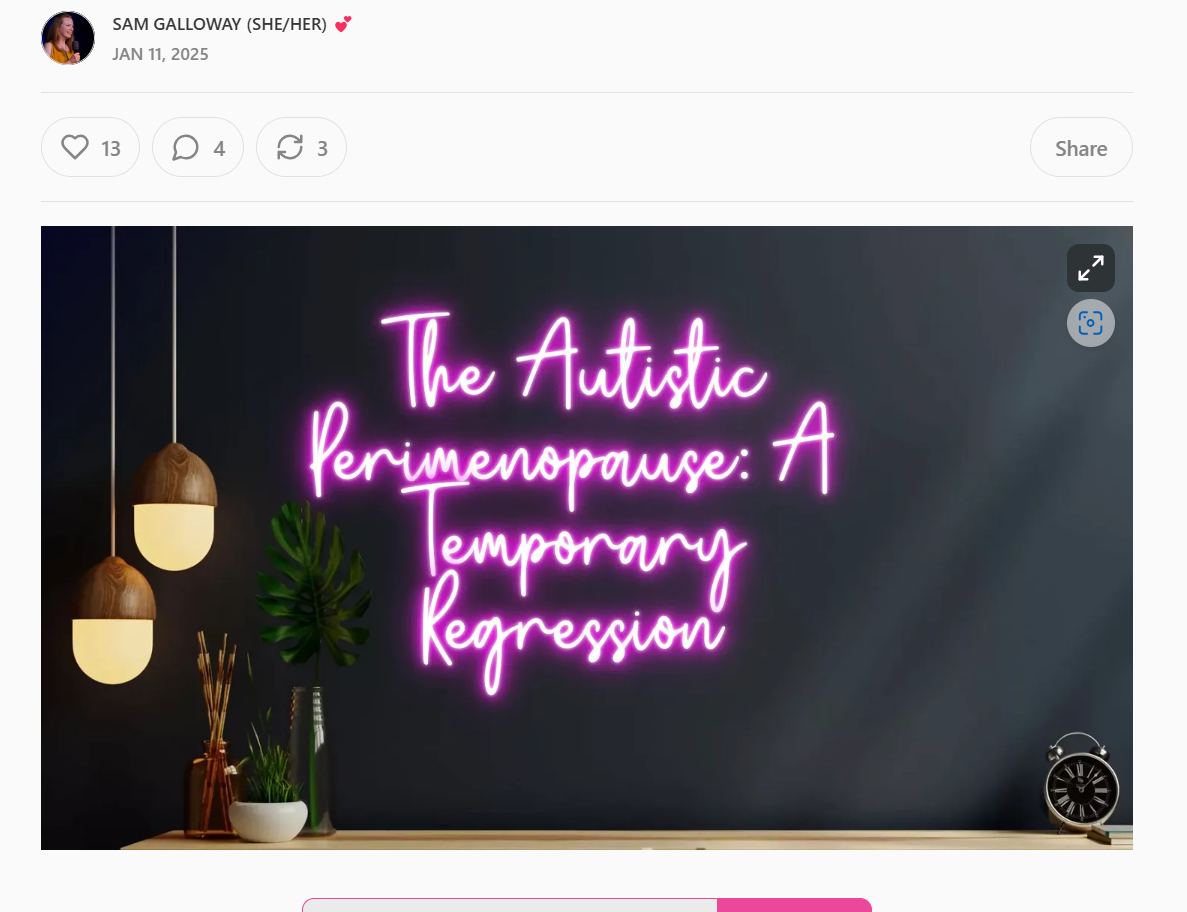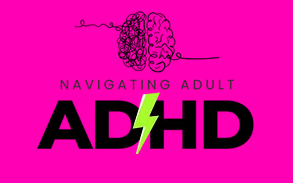Autism + Menopause
Interesting article: https://pubmed.ncbi.nlm.nih.gov/38622794/ Brady et al (4)
“Gaining an appointment is . . . a Herculean feat” (UKP10).
And why “Unexpected physiological, psychological and social changes had a profound effect on participants; several described having inadequate information and support, or no support at all, and entering into a spiral of difficulty and distress in which they felt they could no longer cope” (4)
Why should we care about autism and menopause: Autistic individuals are 3x more likely to commit suicide compared to neurotypical individuals (1) (2)
Initially, when managing hormones in neurodivergent patients, everything can feel a bit overwhelming (at least, it does for me!). There are so many symptoms — it’s hard to know what’s significant — and there’s a lot of uncertainty. But what I’ve come to realise is that in neurodivergence (ADHD, Autism, Sensory Processing Disorders), hormones are essentially on steroids. What neurotypical (NT) patients experience — multiply that for someone who is neurodivergent. And it makes sense. Think about the principles of interoception: the over- or under-awareness of what’s going on in the body. Add in the likelihood of previous trauma from being dismissed, and the challenges with communication — and it becomes even clearer.
This study has been co-designed with autistic individuals from the outset, so providing really unique insight into challenges faced. It showed several specific difficulties faced by autistic individuals during menopause:
• Complex/Intense Symptoms: (and I would also often say ‘confusing’ – for both patient and doctor) Participants reported that symptoms were hard to figure out, had many parts and often worsened their existing autistic traits. (including increased sensory sensitivities and emotional volatility)
• Compounded Life Challenges at Midlife: eg coincided with other midlife stressors, such as career pressures, family responsibilities, and health issues (NB also high rates of late diagnosis)
• Lack of Preparedness and Information: No information. This often is because people don't know what perimenopause is, and/or the information given is not in a neuroaffirming format or something one identifies with
• Barriers to Support and Care: Participants highlighted significant obstacles in accessing appropriate healthcare, with respect to barriers in being understood and logistical challenges making an appropriate appointment
• Social Isolation and Need for Connection: Many expressed feelings of isolation during this transition. They emphasized the importance of connecting with others who shared similar experiences, highlighting the value of peer support and community understanding (this surprised me, but makes sense when I reflect on the neurodivergent community/patients I support)
So what I tend to do is:
• find out what periods mean to my patients, is the menstrual flow (from a sensory perspective) what does it feel like, physically pads/tampons, smell, pain, then cyclical symptoms. And often this even in the first instance gives a huge guide as to how to prioritise management
• then moving forward I tend to provide educaiton/advice as to what the menstrual cycle is doing. I really like the App Fitr woman (it breaks down the science with relevant symptoms at that stage of the cycle and ways to support wellbeing through cycle specific exercises and fuelling).
• and with HRT - I tend to go slow. And often ND have more side effects. But, empowering the individual that we are going to start low, and you may not feel a difference (but if you feel side effects, that also tells us something), then we will increase up. And if one understands what the hormone is doing, they are more likely to be able to manage the symptoms. And then often symptoms improve as the body gets used to it
• I often support and describe the association of the ND with the different conditions, but resist the temptation to jump in (ie and manage the migraines, or diabetes too). I often hang onto the symptoms described, and I am guided by the individiaul
• logistically – executive function and planning are often really challenging for those with autism. And then factor in perimenopause/menopause. Life is hard. Are there ways to support these individuals more? I try to book in ‘back ups’, and also set boundaries for email consultations. Also, many find writing lists/planning for the appointment helpful (3). I have open notes, and support my patients to bring a support person (or have one online), or read the transcript (I use Nabla)
Let me know if you have thoughts/experiences? PMDD occurs about 8% of the general population but 45% of those ADHDers. So it totally makes sense that perimenopause can hit and make a big impact..
Aftermath of Cyclone Gabrielle — a visual reminder of how internal storms can leave lasting marks.
The effects of stress, much like the devastation of a cyclone, can linger far beyond the immediate aftermath. I’ve noticed that many patients, particularly those with neurodivergence or hormone-related challenges, have experienced increased difficulties 6–12 months after Cyclone Gabrielle. While the storm's physical damage was felt right away, the emotional and psychological toll tends to show up later.
Stress doesn’t just affect our emotions; it can also disrupt hormonal balance, amplify cognitive struggles, and trigger mood fluctuations. For those already navigating neurodivergent experiences, this added strain can be overwhelming. The body and mind often go into survival mode immediately after a crisis, but as things settle, the deeper impacts start to surface. It’s a reminder that healing takes time and that we need to be mindful of the long-term effects of stress on both our physical and mental health.
References
(1) Hirvikoski T., Boman M., Chen Q., D’Onofrio B. M., Mittendorfer-Rutz E., Lichtenstein P., Bölte S., Larsson H. (2020). Individual risk and familial liability for suicide attempt and suicide in autism: A population-based study. Psychological Medicine, 50(9), 1463–1474. 10.1017/S003329171900140
(2) Kirby A. V., Bakian A. V., Zhang Y., Bilder D. A., Keeshin B. R., Coon H. (2019). A 20-year study of suicide death in a statewide autism population. Autism Research, 12(4), 658–666. 10.1002/aur.2076
(3) Mason D., Ingham B., Urbanowicz A., Michael C., Birtles H., Woodbury-Smith M., Brown T., James I., Scarlett C., Nicolaidis C., Parr J. R. (2019). A systematic review of what barriers and facilitators prevent and enable physical healthcare services access for autistic adults. Journal of Autism and Developmental Disorders, 49(8), 3387–3400. 10.1007/s10803-019-04049-2
(4) Brady MJ, Jenkins CA, Gamble-Turner JM, Moseley RL, Janse van Rensburg M, Matthews RJ. "A perfect storm": Autistic experiences of menopause and midlife. Autism. 2024 Jun;28(6):1405-1418. doi: 10.1177/13623613241244548. Epub 2024 Apr 15. PMID: 38622794; PMCID: PMC11135000.
The Autistic Perimenopause: A Temporary Regression
Elevating the voices, lived experiences and reflections of autistic people’s menopausal transition.
If you’ve met one autistic menopausal person,
you’ve met one autistic menopausal person.
— Autistic proverb —
Xena Jones and I record on a Podcast on ADHD and Hormones
Our goal with this episode was to create a resource for women with ADHD, helping them understand what’s going on with their hormones, what options are available & where to go for help.
The Paper
The study titled "A perfect storm": Autistic experiences of menopause and midlife explores the experiences of autistic individuals during menopause and midlife. Conducted by Brady et al., the research involved interviews with 17 autistic participants aged between 40 and 65. The findings reveal that autistic individuals often face intensified challenges during menopause, including heightened sensory sensitivities, increased anxiety, and difficulties in social interactions. These challenges are compounded by a general lack of understanding and support from healthcare professionals regarding the intersection of autism and menopause. The study emphasizes the need for greater awareness and tailored support strategies to assist autistic individuals navigating midlife and menopausal transitions.







